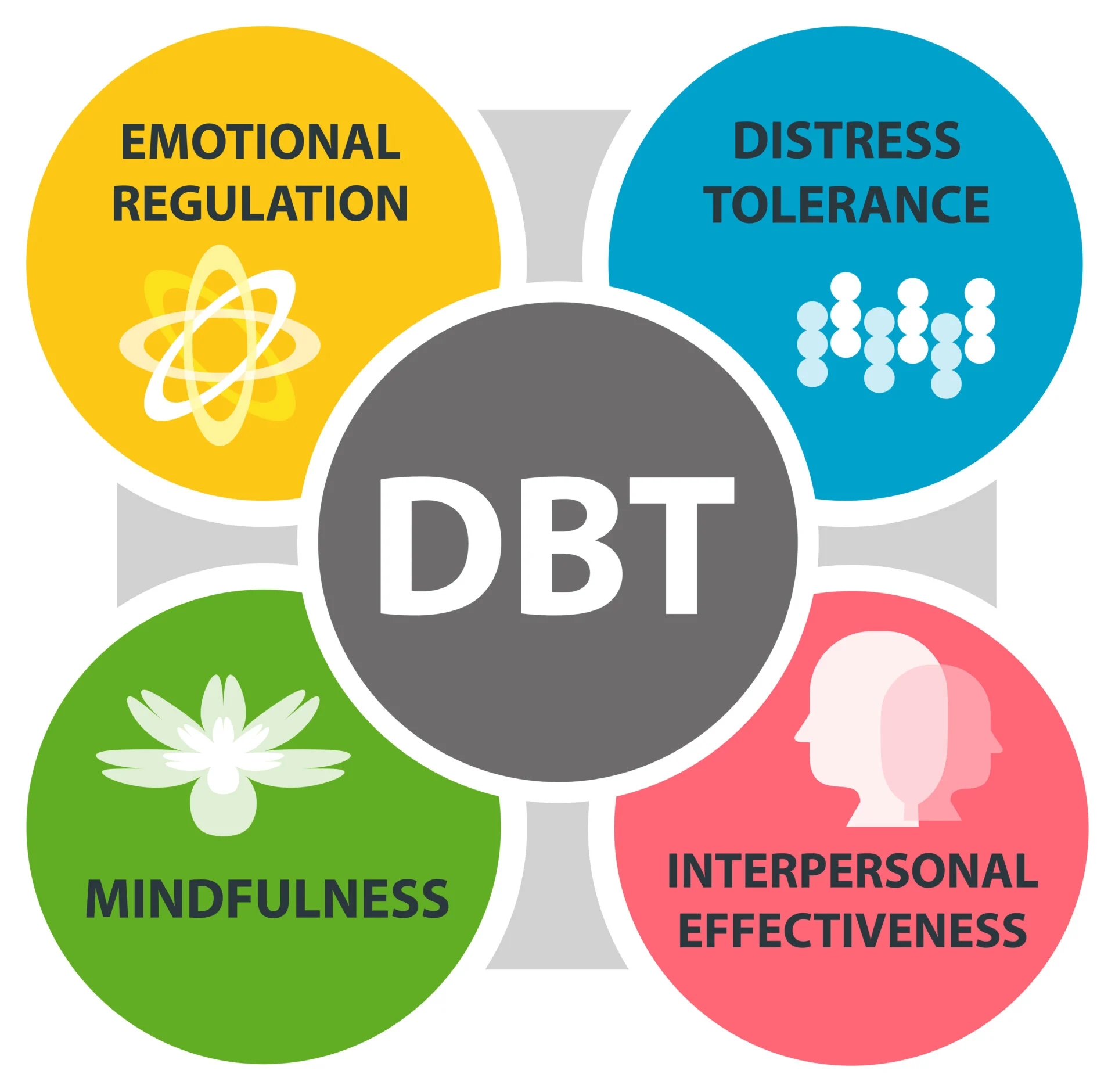Dialectical Behavior Therapy (DBT) - DRHC Dubai Psychiatry Clinic
Dialectical behavior therapy (DBT) is a type of cognitive-behavioral therapy (CBT) that is specifically designed to help people who experience difficulties with regulating their emotions. It was originally developed to treat borderline personality disorder (BPD), but it has also been found to be effective for other conditions, such as depression, anxiety disorders, and eating disorders.
DBT focuses on four main areas:
1. Mindfulness
Mindfulness is the practice of being fully present and aware of the present moment, including your thoughts, feelings, bodily sensations, and the surrounding environment, without judgment. It involves paying attention to your experiences as they happen, rather than dwelling on the past or worrying about the future.
In mindfulness practice, the goal is to observe your thoughts and feelings without getting caught up in them. This can help you develop a greater sense of clarity, calmness, and perspective. Mindfulness is often used as a therapeutic technique to reduce stress, anxiety, depression, and other mental health issues. It can also improve focus, attention, and overall well-being.
Mindfulness can be practiced formally through meditation or informally by bringing mindful awareness to everyday activities, such as eating, walking, or washing dishes. Regular practice can lead to a greater sense of peace and presence in your life.
2. Distress Tolerance
Distress tolerance is a concept in dialectical behavior therapy (DBT) that refers to the ability to tolerate and survive crises and distressing situations without making things worse. It involves learning to accept reality as it is, rather than fighting against it, and finding ways to cope with difficult emotions without resorting to destructive behaviors.
In DBT, distress tolerance skills are taught to help individuals manage overwhelming emotions and situations. These skills include:
- Self-Soothing: Engaging in activities that provide comfort and calmness, such as taking a warm bath, listening to music, or spending time in nature.
- Improving the Moment: Finding ways to make the current moment more bearable, such as using imagery, relaxation techniques, or focusing on one thing at a time.
- Distracting: Engaging in activities that divert attention away from the distressing situation, such as watching a movie, exercising, or socializing with friends.
- Considering Pros and Cons: Weighing the pros and cons of acting on impulsive urges, and considering the potential consequences of different actions.
- Tolerating Distress: Accepting the current situation and the accompanying emotions, recognizing that they are temporary and will pass.
Developing distress tolerance skills can help individuals navigate difficult situations more effectively and reduce the likelihood of engaging in harmful behaviors.
3. Emotion Regulation
Emotion regulation is the ability to effectively manage and respond to an emotional experience. It involves recognizing emotions, understanding their origins and meanings, and then choosing how to act on them. Emotion regulation is a key component of mental health and well-being, as it allows individuals to cope with stress, navigate social situations, and maintain overall emotional stability.
In dialectical behavior therapy (DBT), emotion regulation skills are taught to help individuals better understand and manage their emotions. These skills include:
- Identifying and Labeling Emotions: Learning to recognize and name different emotions as they arise.
- Understanding the Function of Emotions: Understanding the purpose and meaning of emotions, and how they influence thoughts and behaviors.
- Increasing Positive Emotions: Engaging in activities that promote positive emotions, such as hobbies, socializing, or practicing gratitude.
- Decreasing Vulnerability to Negative Emotions: Identifying and changing thoughts and behaviors that contribute to negative emotions.
- Mindfulness of Current Emotions: Practicing mindfulness to observe and accept current emotions without judgment.
- Opposite Action: Acting opposite to the urge associated with an emotion to change the emotion itself.
- Problem Solving: Identifying and implementing solutions to address the source of an emotion.
By developing these skills, individuals can learn to manage their emotions more effectively, leading to greater emotional stability and overall well-being.
4. Interpersonal Effectiveness
Interpersonal effectiveness is the ability to communicate and interact with others in a way that is respectful, assertive, and mindful of one's own needs and boundaries. In dialectical behavior therapy (DBT), interpersonal effectiveness skills are taught to help individuals navigate relationships and social interactions more effectively.
There are three main goals of interpersonal effectiveness in DBT:
- Objective Effectiveness: Achieving one's objectives or goals in a specific situation while maintaining self-respect and improving the relationship with the other person.
- Relationship Effectiveness: Building and maintaining positive and healthy relationships with others, while balancing priorities and maintaining self-respect.
- Self-Respect Effectiveness: Acting in a way that is consistent with one's values, beliefs, and self-respect, even in difficult or challenging interpersonal situations.
To achieve these goals, DBT teaches specific interpersonal effectiveness skills, including:
- DEAR MAN: A skill for effectively asking for what you want or saying no to requests, while maintaining self-respect and the relationship.
- GIVE: A skill for maintaining and improving relationships by being gentle, interested, validating, and using an easy manner.
- FAST: A skill for maintaining self-respect in interactions by being fair, apologizing when necessary, sticking to values, and staying truthful.
These skills help individuals communicate more effectively, set boundaries, and navigate interpersonal interactions with confidence and self-respect.
DBT typically involves individual therapy, group skills training, and phone coaching. It's a structured, goal-oriented approach aimed at helping individuals create a life worth living.
.png?width=281&height=59&name=bookanappointment%20(1).png)
If you are experiencing any signs and symptoms of a Dialectical Behavior Therapy (DBT), please don't hesitate to contact our best psychiatrist in Dubai at the Dr Rami Hamed Center, Call +97142798200 to Schedule Your Appointment Today. We have the best psychiatrist doctor, and our psychiatry clinic is situated in Dubai Healthcare City.




.png?width=281&height=59&name=bookanappointment%20(1).png)
.png?width=1080&height=1080&name=DR%20KIRTI%20(1).png)





